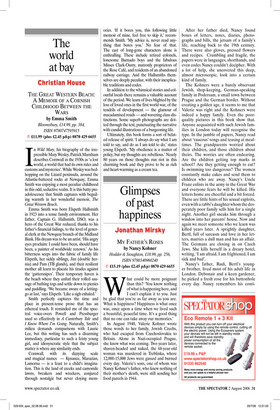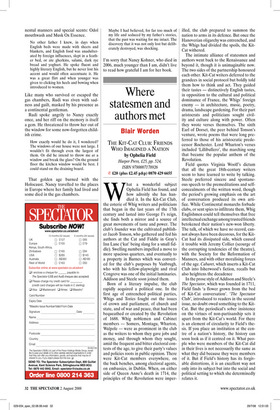Glimpses of past happiness
Jonathan Mirsky
MY FATHER’S ROSES by Nancy Kohner Hodder & Stoughton, £18.99, pp. 256, ISBN 9780340960240 ✆ £15.19 (plus £2.45 p&p) 0870 429 6655 What could be more poignant than this? ‘You know nothing of what is happening here, and I can’t explain it to you. Just be glad that you’re as far away as you are. What is happiness? Happiness is what once was, once upon a time when we lived such a beautiful, peaceful time. It’s a good thing that no one can take away our memories.’ In August 1940, Valerie Kohner wrote those words to her family, Jewish Czechs, who had escaped from Czechoslovakia to Britain. Alone in Nazi-occupied Prague, she knew what was coming. Two years later, shaven-headed and naked, the 68-year-old woman was murdered in Treblinka, where 12,000-15,000 Jews were gassed and burned every day. Valerie’s sons, one of whom was Nancy Kohner’s father, who knew nothing of their mother’s death, were still sending her food parcels in 1944. After her father died, Nancy found boxes of letters, notes, diaries, photographs and bills, the jetsam of a family’s life, reaching back to the 19th century. There were also gloves, pressed flowers and recipes. Crumbling and fragile, the papers were in languages, shorthands, and even codes Nancy couldn’t decipher. With a lot of help, she uncovered this deep, almost microscopic, look into a certain kind of family.
The Kohners were a barely observant Jewish, shop-keeping, German-speaking family in Podersam, a small town between Prague and the German border. Without creating a golden age, it seems to me that Valerie was right and the Kohners were indeed a happy family. Even the poorquality pictures in this book show that. Anyone acquainted with such Jewish families in London today will recognise the type. In the jumble of papers, Nancy read about ‘raucous’ songs and teasing at mealtimes. The grandparents worried about their children, and those children about theirs. The worries are often endearing. Are the children getting top marks in school? Are they getting enough to eat? Is swimming too dangerous? The women constantly make cakes and send them to children who are away. Nancy’s Uncle Franz enlists in the army in the Great War and everyone fears he will be killed. His letters home are cheerful and a bit forced. There are little hints of his sexual exploits, even with a rabbi’s daughter whom the desperately poor family sells him for a single night. Another girl sneaks him through a window into her parents’ house. Now and again we meet someone who we learn was killed years later. A sprightly daughter, Bertl, full of sarcasm and love in her letters, marries a dull man and has an affair. The Germans are closing in on Czech Jews. She kills herself in a dreary hotel, writing, ‘I am afraid, I am frightened, I am sick and bad’.
Nancy’s father, Rudi, Bertl’s younger brother, lived most of his adult life in London. Debonair and a keen gardener, he picked a fresh rose for his buttonhole every day. Nancy remembers his conti nental manners and special scents: Odol mouthwash and Musk Ox Essence.
No other father I knew, in days when English beds were made with sheets and blankets, and English food was unadulterated by foreign influences, slept in a feather bed, or ate gherkins, salami, dark rye bread and yoghurt. He spoke fluent and highly literary English, but he never lost his accent and would often accentuate it. He was a great flirt and when younger was given to clicking his heels and bowing when introduced to women.
Like many who survived or escaped the gas chambers, Rudi was riven with sadness and guilt, masked by his presence as a continental gentleman.
Rudi spoke angrily to Nancy exactly once, and her riff on the memory is itself a gem. He threatened to throw her out of the window for some now-forgotten childish crime.
How exactly would he do it, I wondered? The windows of our house were not large. I wouldn’t fit through even the largest of them. Or did he intend to throw me at a window and break the glass? On the ground floor the kitchen window would be best. I could stand on the draining board.
That golden age burned with the Holocaust. Nancy travelled to the places in Europe where her family had lived and some died in the gas chambers.
Maybe I had believed, for far too much of my life and seduced by my father’s stories, that the past was waiting for me intact. The discovery that it was not only lost but deliberately destroyed, was shocking.
I’m sorry that Nancy Kohner, who died in 2006, much younger than I am, didn’t live to read how grateful I am for her book.



























































 Previous page
Previous page